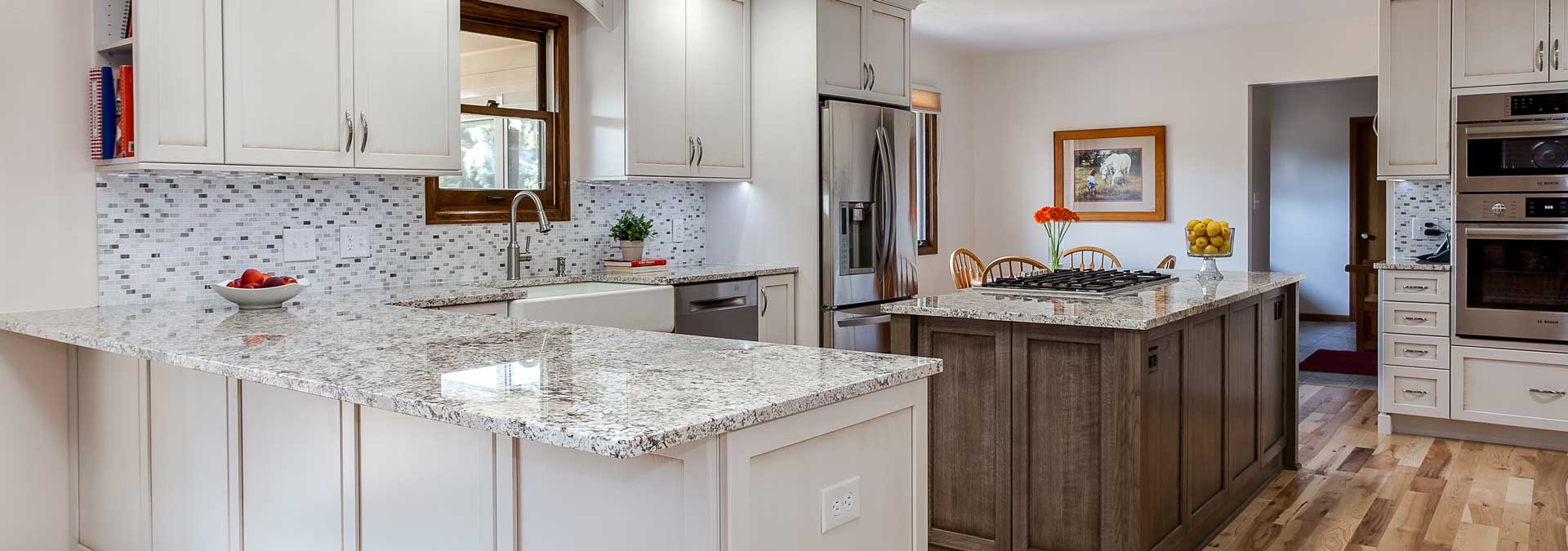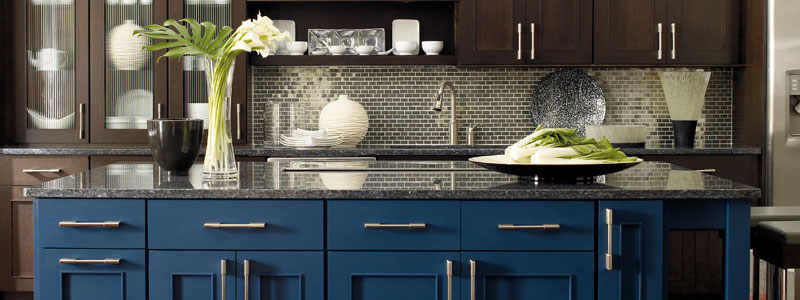 Kitchen & Bath Countertops for Your Home
Kitchen & Bath Countertops for Your Home
A Different Take on Countertops
Most clients are familiar with common countertop materials such as marble, granite or quartz. However, those popular options by no means limit a palate or choices. Other popular countertop materials include;
Laminate (Formica, Wilsonart, Devmar, and others): Laminate is cost-effective, comes in hundreds of colors and patterns and is easy to clean and maintain.
Wood (Butcher Block): Wood is a living product that will change over time. Wood will show wear and tear, nicks and scratches; it is not heat resistant and needs to be sealed regularly. The attractiveness of wood is its ability to add character and warmth to a kitchen. Another advantage of wood is the range of available thicknesses and edges. Wood countertops should be viewed and used as a piece of fine furniture as opposed to a high-performance kitchen top solution. Designers often pair wood with other countertop materials.
Stainless Steel: Professional chefs gravitate to stainless steel, in part, because it is impervious to bacteria and heat. Stainless steel requires more maintenance than most other surfaces because of its propensity to scratch and show water spots and fingerprints. Stainless steel is often selected to create an industrial look or for those who want the look and feel of a commercial kitchen.
Recycled Glass: This green material is easy to clean and maintain, stain resistant, heat resistant, durable and strong. Each glass countertop is unique, providing a custom look. Recycled glass, despite its strength, can crack if not properly installed. Also, some designs easily show fingerprints and water spots.
Concrete: Concrete is extremely durable and is often custom formed in the kitchen or bath to fit any size, shape, texture or color desired. Concrete countertops need to be regularly sealed to prevent staining. Additionally, concrete tops can scratch and chip.
Solid Surface (Corian and Swanstone, among others): Solid surfaces are made from acrylic, generally less expensive than stone or quartz and easy to clean and maintain. They come in rainbows of colors and the material is unique in that the seams can be invisible. Solid surface countertops can be damaged by heat and are susceptible to scratching.
Tile: Common countertop tiles are made from ceramic, glass, granite and porcelain. Tiles come in an endless array of styles, colors, shapes, and textures and can be sized to fit any motif. Tile countertops tend to be labor intensive for installation and need to be sealed regularly to prevent damage to the grout. If you are interested in granite, marble, glass, porcelain or another type of natural stone, a way to reduce material cost is to select tile instead of slabs, but doing so will increase your installation and maintenance costs. While there may be cost-saving advantages to go with tile over slabs, there are also huge performance differences. Slabs do not require grouting or feature grout lines. Plus, stone, quartz, marble and glass slabs last longer than tile alternatives.
Porcelain: Porcelain countertops are available in an endless array of colors, patterns, and textures; they are easy to clean and heat resistant. Porcelain is also stronger than granite and lighter. Porcelain slabs are extremely durable but there is the potential for chipping and cracking.
Seeing Is Believing
What countertop would fit perfectly in your new kitchen?
Granite vs Quartz vs Corian®?
What should I choose for my countertops when I’m designing or remodeling my kitchen?
Granite countertops have been a cornerstone for our new and remodeled kitchens for years in Colorado. Quartz countertops have become very popular due to its durability.
Kitchen Countertop Comparison: Granite, Quartz and Solid Surface Countertops
We know the choices you have for selecting your kitchen countertop can be overwhelming and JM Kitchen designers are here to help. We will discover first what style of kitchen you are looking for, then color preferences and then what sorts of use your kitchen is going to get. An active family that loves to cook, eat and play in their kitchen might need a different surface for their countertops than a young couple just starting out who mostly use their microwave to reheat restaurant food. That’s where our 20+ years of experience will come into play. Below we’ll outline the pros and cons of each type of countertop surface to give you some ideas about your priorities.
Significantly, the market is choosing between Granite and Quartz and the choice is usually made on, man-made Quartz and consistent looking colors (like in contemporary or modern kitchens), or natural Granite with the flow and variations (like in the more rustic or casual kitchens).
To get an idea of the range of colors available with granite take a look at Cactus Stone’s gallery of options that you can explore by type of stone or by color here.
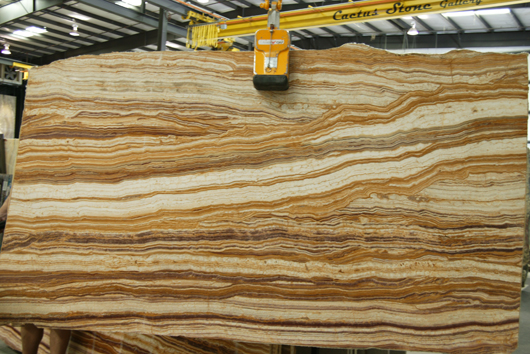
Granite Countertops Natural but Not Perfect
Pro’s of Granite
If you love a rustic or natural look in your home then what could be considered “con’s” to some might not apply to you. Its crystalline nature causes it to have tiny pits or spaces where the minerals collect along with natural fissures that appear as cracks but are not defects and won’t hurt the function or durability of your granite countertop.
Your countertop will not look the same as the one you might see on a showroom floor. This is the nature of “natural” countertop surfaces. The colors and patterns can vary greatly from slab to slab.
Durable but not indestructible. Granite countertops are extremely durable, scratch resistant, and impervious to water and heat. If not abused, it will hold its luster forever.
Con’s of Granite
- It is impossible to hide a seam with granite.
- Granite must be sealed
- Granite is a natural stone product that has a certain degree of porosity and must be sealed before use.
- Maintenance is required, the stone must be resealed at least once every three years, or you could have a 15-year sealer put on it so you don’t have to maintain it as often.
- Can discolor in rare instances. While granite counters are ordinarily considered to be stain-resistant, some pigments or oils can be absorbed into the surface. This could cause discoloration. The sealer does not prevent this discoloration, but it slows it down to allow more time for clean-up. The more permanent 10-year sealer is warranted for 15 years against stains.
- Because it is a natural rock, it can be chipped and broken if abused and is very difficult to repair. In rare instances, fissures can crack from intense heat.
- Must be professionally installed.

Quartz Countertops (Engineered Stone)
A man-made non-porous material, made from a mixture of 93% quartz and 7% resin binders and pigments. It has the strength of granite but is more flexible – making it somewhat easier to handle.
Quartz Countertop Pro’s
- Needs no sealing
- Mold & mildew resistant.
- Extremely hygienic, making it a food-safe choice.
- Uniform appearance.It has the general appearance of natural stone, but with a consistent pattern and color. (The final product should be very close to what you see in the showroom.)
Quartz Countertop Con’s
- Seams are visible.
- Durable but not indestructible.
- It is resistant to stains caused by wine, fruit juices, liquid food coloring, tea, nail polish and remover, and felt-tip markers. It can be damaged by high heat and prolonged exposure to heat. As with any other stone or surface material, strong chemicals and solvents such as Drano®, Liquid Plumr®, oven cleaners and floor strippers will damage the surface.
- Continuous long-term exposure to direct sunlight (UV rays) may result in slight discoloration of Quartz Stone countertops.
- Must be professionally installed
- Is much heavier than granite
On granite and quartz with polished finishes, do not clean with any ammonia based products (like glass plus) as they will, over time, etch the polished finish.
Solid Surface Countertops also known as Corian®
This is a man-made solid surface is a 100% acrylic material which is colored by resins.
Corian® Pros:
- Uniform appearance, consistent pattern and color.
- Final product very similar to the showroom sample.
- Seams are inconspicuous to invisible.
- Virtually maintenance free, no sealing required
Corian® Cons:
- Durable but not indestructible
- Mold and mildew resistant.
- Susceptible to heat damage and burns )Avoid exposing the surface to harsh chemicals such as paint removers/thinners, acetone-based cleaners, stove/drain cleaners, etc. If these come in contact with the surface, quickly wash off with water, using the appropriate safety measures to avoid injury.
- Must be professionally installed.
- Must be professionally re-surfaced.
There is a lot of information here to digest but don’t let that discourage you, this is where our expert design and construction team comes in.
Laminate Countertops
Solid Surface Countertops
- Corian
- Surell (by Formica)
- Gibraltar (by WilsonArt)
- Fountainhead® – by Formica solid surfacing material is a polyester resin-based product. Because it has solid color throughout, it can be routed, shaped, sculpted, engraved, and sandblasted. Fountainhead® is available in sheet stock for counter and wall applications, kitchen and bathroom bowls, vanity tops, and shower bases, and is offered in an extensive range of colors and textures.
- Avonite
- LG Hi-Macs
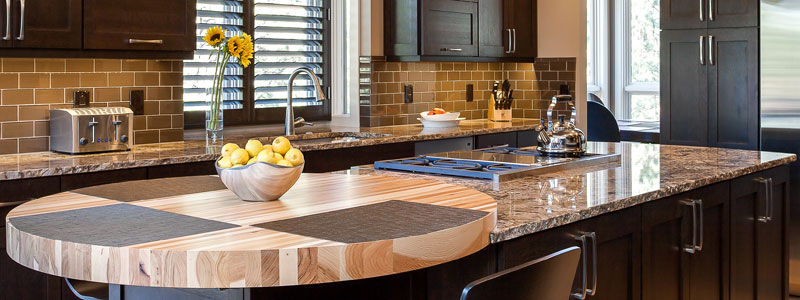
Quartz-Engineered Stone
- Caesar Stone – The manufacture of slabs from a mixture of ground quartz aggregates, pigments and polymers proved to be the unique components necessary for this new generation of surfacing.
- Cambria
- Hanstone
- LG Viatera
- One Stone
- Silestone
- Zodiaq
Granite – Natural Stone
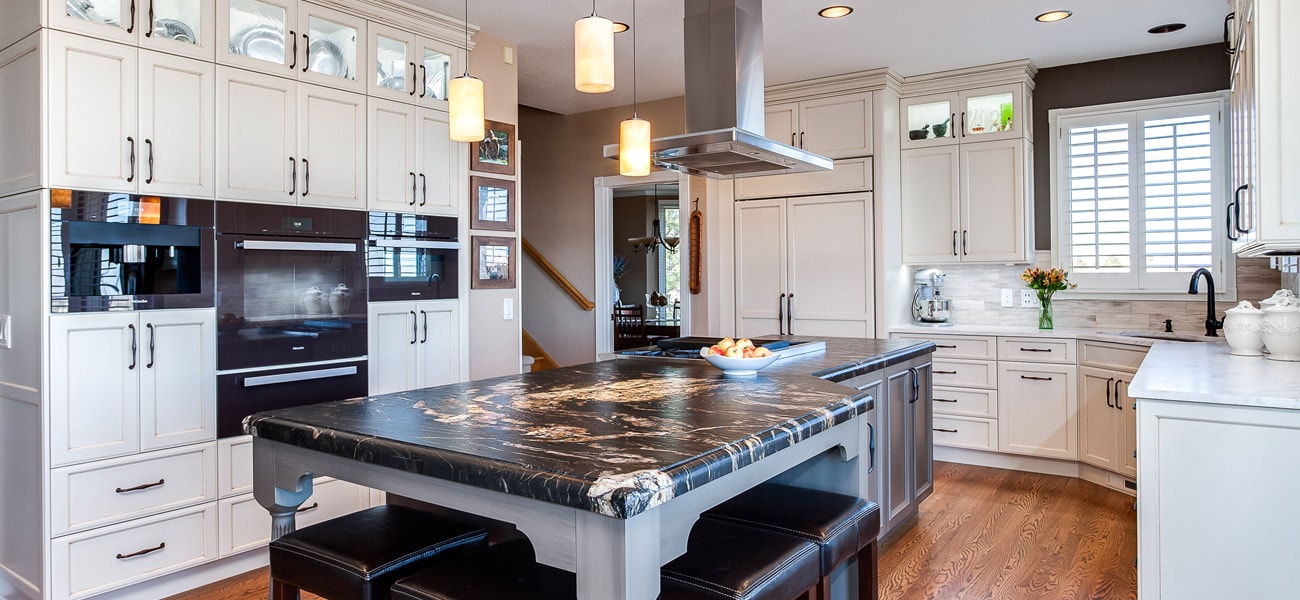
Metal Countertops
- Stainless Steel
- Copper
Recycled – Glass & Concrete
- Eco by Cosentino
- IceStone – manufactures the world’s safest and most sustainable recycled glass and concrete countertops, vanities, and desktops for your home.
- Trinity Glass Products
- Zodiaq – Terra Collection
As you can see your countertop options are limited only by your imagination. Our designers will help you select the best option while keeping your design options and lifestyle in mind.

